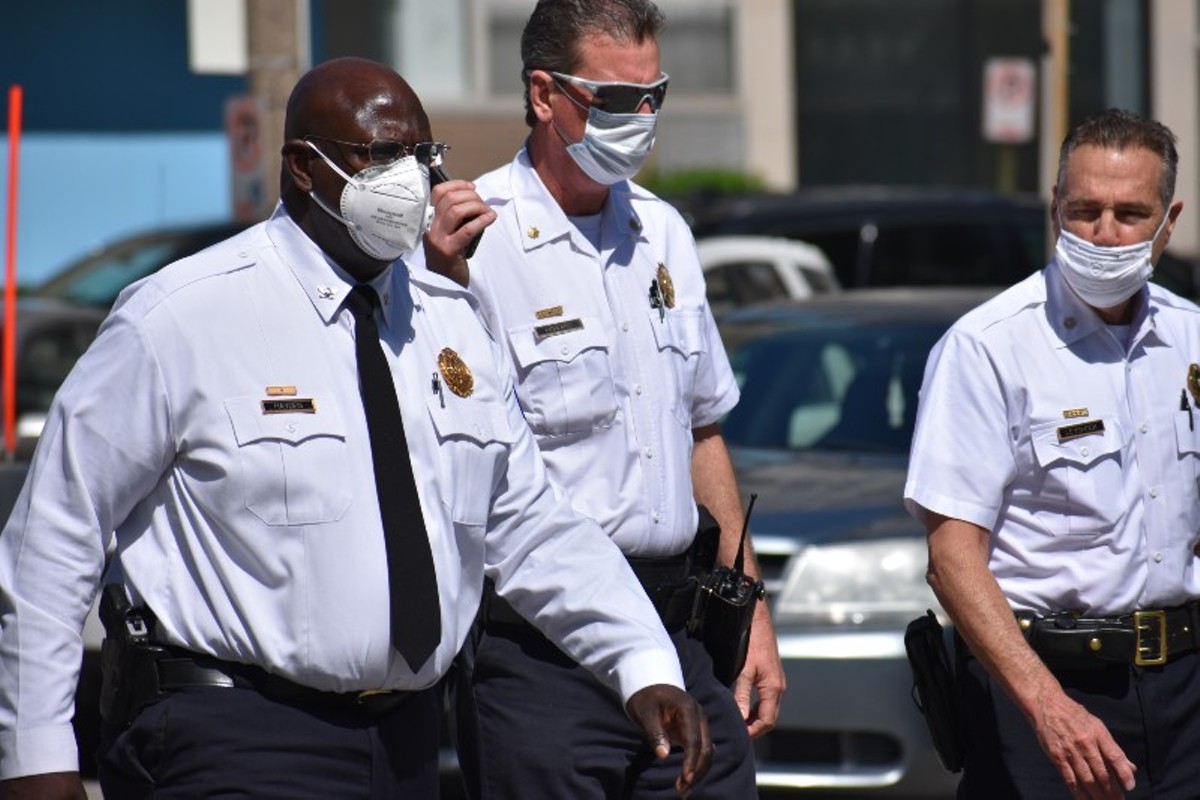The two top police-chief positions in the St. Louis area have just become vacant, and applications are now being accepted.
In other employment news, window-washer jobs abound in hurricane country. And local companies are offering opportunities to handle radioactive materials with half-lives of 24,000 years.
The most prestigious jobs in local law enforcement are not the most desirable. In both city and county, the highest posts probably should be reserved for the highest applicants.
Chief John Hayden announced last week that he would retire in February from the top spot in the city. That came less than six weeks after county police Chief Mary Barton let it be known that she was leaving to spend more time with her $290,000 sex-discrimination settlement from the department.
Catch up on Ray Hartmann's latest columns
Hayden was on the job less than four years, Barton just fifteen months. Neither of the two will have a statue built for them, but apparently each had a fine career spanning decades of service — until hitting the wall as chief.
Mind you, running a major metropolitan police department in 2021 is no piece of cake. Especially not in a city known as the murder capital of the nation — unless Chicago or Detroit might be having a bad week. Throw in a pair of racially torn police forces known for low morale and a wide array of management issues and you’ve got quite a task. Oh, and did I leave out navigating the warring and often irrational politicians?
Even in placid police departments, the job of chief requires a rare blend of skill sets. A chief must know everything about the technical and strategic aspects of police work and must possess high-level management and motivational skill, integrity, fairness — and the ability to inspire, or at least build trust among, members of divergent communities.
To accomplish the latter requires sharp communications skill, especially in dealing with the news media. It was obvious that neither Hayden nor Barton were suited for that part of the job, especially not Barton. They were better candidates for the Witness Protection Program than the office of police chief, and failed miserably as the respective public faces of their departments. (And that’s not counting Barton’s legendary whiff of a question on systemic racism in which she denied its existence during the George Floyd protests.)
The part could and should have been vetted and perhaps next time will be. Meanwhile, as to that path forward, just spin the wheel, especially in St. Louis County.
Ah, the county police department. In the past two years, it has lost a $20 million LGBTQ discrimination verdict — settling for a paltry $10.25 million — in the case of then-Sgt. Keith Wildhaber. Then there was the aforementioned sex-discrimination settlement with Barton, the county’s first-ever female chief. And multiple race-discrimination lawsuits are pending from Black officers, including one from Lt. Col. Troy Doyle, a Black man who seemed a consensus choice for chief until he wasn’t.
Let’s see, that’s LGBTQ sex discrimination, female sex discrimination and potentially race discrimination. Maybe they should try to run the table by hiring and firing an elderly disabled Jewish police chief. Just a thought.
You’ll recall it was County Executive Sam Page caught on tape promising Doyle he would be selected chief because “the police board will do what I tell it to do” — until they didn’t — whereupon they settled on Barton as a compromise choice. And then Doyle sued them.
Adding no small amount of intrigue was the apparent role in Barton’s selection — albeit a hazy and unconfirmed one — of Barton’s predecessor as chief, Jon Belmar. By amazing coincidence, Belmar is the security chief hired by Centene CEO Michael Neidorff, who along with his company and its executives represents by far Page’s largest campaign contributor.
Presumably that means nothing, maybe. But it’s the great X factor. Meanwhile, six weeks after Barton left, sources tell me that internally officers haven’t even been informed what ranks will be considered eligible for the next chief’s selection.
So, it all seems so different from the last time. Or not.
The city situation is different. There, the decision rests in the hands of St. Louis Mayor Tishaura Jones, which is encouraging since she has made some fine hires, notably acting Public Safety Director Dan Isom, who was widely respected as city police chief a decade or so ago. One would hope Isom will play a key role, since the chief presumably will report to him.
But with all the problems of the city department, it seems obligatory for a national search to ensue. That should be interesting: St. Louis doesn’t merely have that horrific reputation for murders. The department’s history of racism — systemic and otherwise — is off the grid.
For his part, Hayden claims hiring has been a huge challenge, helped not at all by the fact that the beleaguered city starts officers at substantially below the pay rates of many surrounding departments, including the county’s. And there’s the minor matter of being situated in the Neanderthal state of Missouri, a nightmare for law enforcement officials desperate to control gun violence.
Perhaps no better metaphor for the trauma facing the next city police chief was provided by the classless reaction to Hayden’s departure announcement from one Jeff “I am Darren Wilson” Roorda, business manager of the city police union. Here’s what Roorda had to say, according to the St. Louis Post-Dispatch:
“Speaking for myself, I really, really hope that John Hayden’s final act as police chief will be to apologize to St. Louis for the epic failures that have characterized his time at the top of this department. Violent crime exploded, police officers left in record numbers, and when it was time to stand up for his officers, he always ran the other way.”
Roorda added that the city “needs a bold, collaborative leader willing to work with every single stakeholder” to get the crime problem under control.
Roorda’s model police chief is Bull Connor. When this guy talks about collaboration, it’s in the spirit of “very fine people on both sides” in Charlottesville.
For the record, Hayden is hardly responsible for the city’s increase in violent crime, nor for its racism, nor for its political dysfunction. No police chief could be. The same can be said of Barton in the county.
No one person is likely to work miracles in the role of police chief in a place like St. Louis. So the smart path is to maintain lowered expectations and a sense of realism. To the extent that unexpected success might lie on the horizon for the next two major police chiefs, keep the doors open.
But nobody’s going to be kicking them down.
Ray Hartmann founded the Riverfront Times in 1977. Contact him at [email protected] or catch him on Donnybrook at 7 p.m. on Thursdays on the Nine Network and St. Louis In the Know With Ray Hartmann from 9 to 11 p.m. Monday thru Friday on KTRS (550 AM).






